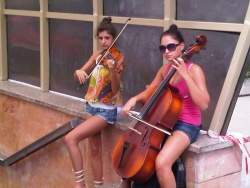Arriving in Sofia in August as I did is perhaps not the right time to visit. While the weather is warm (but not oppressive) during the day and nights are very pleasant, still, the city is quiet as most people head to the Black Sea for holidays. I've seen that happen in other places, like Paris, but in Sofia there aren't loads of tourists replacing exiting residents so the city seems quieter than usual.
For many, this is a plus as you can get in anywhere, easily catch a taxi, and nothing is crowded. But I did feel that I missed some of the city's usual vitality. Nevertheless, I was here to explore and it made my touring easier.
I arranged a private guide in advance through my hotel for day one. I highly recommend a guide and it's not very expensive. Our guide, Roumiana Peteva, was fantastic. She has led tours for over 20 years and I thoroughly enjoyed our three-hour city overview. We hit all the highlights, including the Alexander Nevsky Cathedral, St. Sofia Church, the Russian Church (St. Nikolai Church), National Theater, Archeology Museum, and the National Museum of History (www.historymuseum.org) (quite a testament to Communist architecture at the base of Vitosha Mountain). Roumiana was also delightful in chatting with me about Bulgarian history, culture, and people. You can contact her directly at 011-359-889-255-903 or rumi_peteva@abv.bg.
One can't miss the fact that Sofia was a Communist state. While there are many lovely 19th-century buildings, one also sees a bevy of Stalinesque, hulking socialist government buildings and monotonous drab apartment blocks which remain in and around town. However, it is this mix that makes for a fascinating walking or driving tour of town.
As in all the other countries in Eastern Europe that fell under Soviet hegemony after World War II, Bulgaria was a socialist economy from 1945 to 1989, and it is still very much trying to improve its standard of living. There is a privileged class for sure as one can see luxury cars, condos, and shops in the city center. At the same time, the people lament the government corruption, ineffective policies, and the Bulgarian mafia.
It seems that Bulgaria has suffered over many centuries, with the period of Ottomon rule referred to as the Dark Ages for the country. When the Turks were kicked out (with Russia's help), Bulgaria enjoyed a period of independence until World War II. Then the country came under Nazi sway. However, as Bulgarians take pride in explaining, the Jewish Bulgarian community was saved from the mass deportations to concentration camps that occurred in other occupied territories.
Still, despite historical hardships, the country is moving positively forward, and it is sure to grow its share of the global tourism market. I was told that Banska, located about two hours from Sofia, has emerged as an attractive winter ski resort (lots of Brits vacation there). Note that Vitosha Mountain just outside Sofia is also good for winter skiing.
And in summer, it's definitely worth a stay along the sea in Varna or Borgas (alternatively, try Albena for a quieter stay or Sunny Beach for a party atmosphere). If I had more time, I would have taken the five-hour drive or flown south. With the next winter Olympics in Sochi (further up the Black Sea in Russia), this region will receive more press soon enough.

In regards to the people, the Bulgarians are quite friendly after some prodding. On the streets, this isn't evident (I didn’t see a lot of smiling faces, but that's sort of common in Central and Eastern Europe). Just press a bit and they will open up. Service is good, and people are keen to help a lost foreigner.
What I love about Sofia is that it's a pretty city (certainly one of the prettiest large cities of Eastern Europe, after Budapest and Prague) and it's an easy city to get to know by just walking around. That was how I found some of my favorite places for eating or drinking.
For cafés, try the Art Club Museum café or Victoria Pizza (despite the name it's a very lovely spot). For dinner, try Pri Yafata for Bulgarian cuisine (ok, it's a bit kitschy but the food is good; try the local wine by No Man's Land winery – it's excellent), Kumbare for Greek, or La Capannina for Italian. Motto (www.motto-bg.com) has a very lovely courtyard terrace though the food is just fair; go for dessert and drinks. As for nightlife, some hot spots are Buda Bar and Chervilo (www.chervilo.com).
On the shopping front, remember that a lot of good designer clothing is actually made in Bulgaria, so check out some of the clothing shops. Also, for some reason, Bulgarians love to paint and there are some excellent artists offering pieces that would sell for five or ten times the price in the U.S.
Finally, I suggest if one comes all the way to Sofia to consider combining it with a trip to the Black Sea. Other great add-on possibilities include neighboring Turkey (Istanbul), Serbia (Belgrade), or Greece.

